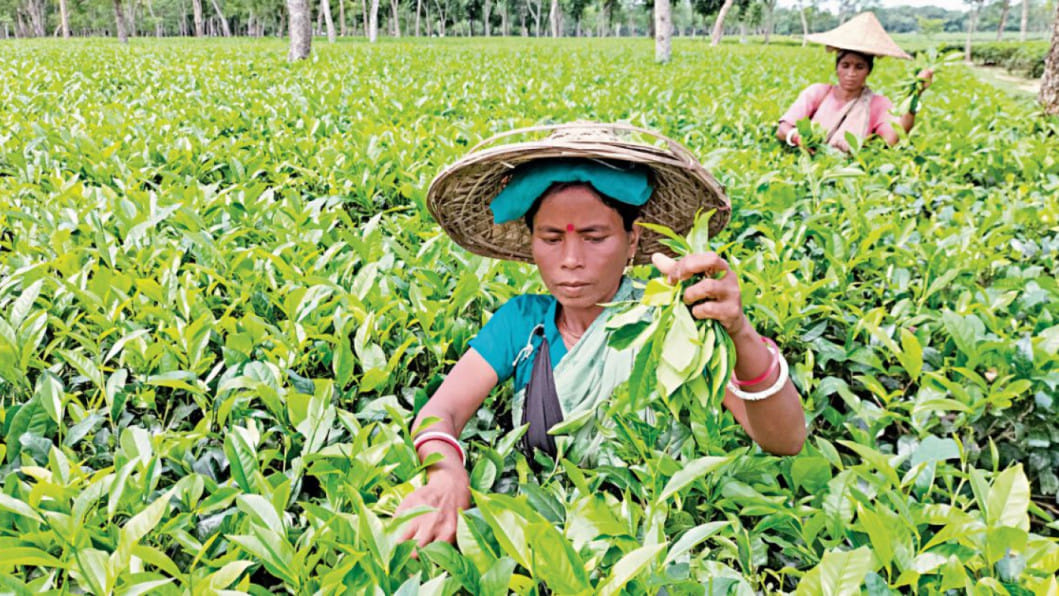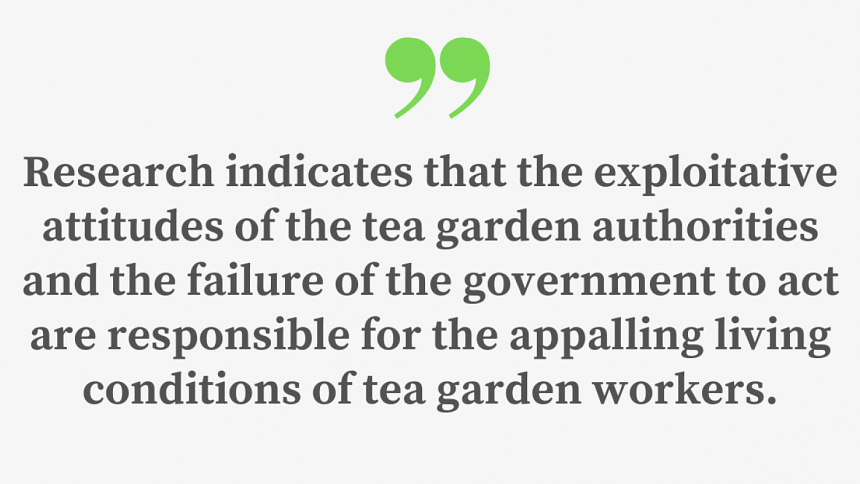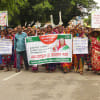Why are tea garden workers trapped in a cycle of poverty?

Tea export from Bangladesh has been consistently on the decline – from 12 million kilograms in 2001 to just 0.68 million kilograms in 2021. However, domestic consumption of tea has been growing by approximately five to six percent annually, standing at 95 million kilograms in 2019. If tea production cannot keep up with the growth in domestic consumption, Bangladesh, in the near future, may need to spend its precious foreign currency to import tea.
Historically, the tea industry in Bangladesh has been standing on the backbreaking labour of tea garden workers, most of whose ancestors were transported here from the impoverished states of Bihar, Odissa and West Bengal in British India. Currently, around 100,000 permanent workers and 30,000 seasonal workers work in 167 tea estates. The total number of tea workers and their family members is estimated to be around 500,000. The majority of them are illiterate, work for very low wages, and enjoy few rights or privileges in the tea estates where they work and live. They are ethnically, racially, religiously, linguistically and culturally distinct from other Bangladeshis, intensifying their isolation and vulnerability. The well-being of tea workers would be crucial for the growth of the industry. More importantly, it is also an issue of human rights and inclusive development.
Research indicates that the exploitative attitudes of the tea garden authorities and the failure of the government to act are responsible for the appalling living conditions of tea garden workers. The households in these communities, for instance, have a high population growth rate due to a lack of education on family planning. From the authority's standpoint, however, a high population growth rate is advantageous, as it guarantees a continuous surplus of labour. The owners of tea gardens are not very concerned about improving the human capital in the tea garden areas by investing in the community's health, education, and needs-based skill sets. The very few primary and secondary schools that exist are run by the tea garden authorities. Parents initially bring their kids to these schools but soon find themselves unable to pay for books, uniforms and other necessities, eventually sending their teenagers to work as casual labourers in the tea gardens to make ends meet.
Because of their socioeconomic conditions and cultural orientation, they are naturally risk averse, unwilling to take any risks in exchange for a better future. Instead, they accept their current situation because of the certainty associated with working in tea gardens. Most households with at least one permanent work permit prefer to remain on tea estates. Holding a permanent work permit guarantees access to housing within the boundaries of the gardens, weekly ration, primary medical care, retirement benefit, 20 full working days of earned leave, and other perks.

The quality of these benefits, however, is questionable. Although the majority of tea garden workers are dissatisfied with the tea garden authorities for failing to fulfil the obligations of their employment contracts, they refuse to quit their jobs under any circumstances due to the possibility of losing their right to residential benefits. The level of security they perceive from this long-term permanent contract is greater than their anticipated risks of leaving the tea gardens in search of jobs where they could earn significantly higher daily incomes. The lack of information workers have about the growing labour market outside the tea gardens also plays a critical role in this regard.
Furthermore, in the absence of the necessary capital, skill, experience and, most importantly, distribution channels for entrepreneurial pursuits, tea garden workers are afraid to take up different income-generating activities. It is thus unsurprising that almost all small and medium business activities, other than businesses related to tea gardens, that have developed and are developing around tea gardens, are controlled and occupied by the Bengali community. Hence, tea workers are confined to the tea garden due to a two-way link between their lack of ability to launch income-generating operations and the lack of a well-developed market for their labour/product. The garden authorities take advantage of this by offering workers wages that are lower than the equilibrium rate.
So, how can the tea workers escape the cycle of perpetual poverty they are currently trapped in as a result of the complex issues that exist among tea garden workers, garden authorities, and the surrounding Bengali community?
Besides recent government declarations for taking some measures, other short- and long-term actions should be taken to improve the plight of this impoverished community. For household members who work on a temporary basis and are unemployed, need-based skills development training should be one of the short-term solutions. A market channel should be established concurrently so that they can sell their labour or product and make some extra income. Additionally, this will raise the minimum wage in the local labour market. Steps should be taken to reduce the information asymmetry that still exists between this group and others outside of the area.
For long-term solutions, all parties involved – the government, the tea garden authorities, and all other individuals who occupy positions of authority in the tea garden community – should cooperate to build up the human capital of this underprivileged area. Although the government has already promised to nationalise schools in the tea gardens, establish community clinics for improved treatment facilities, etc, measures should be taken to ensure timely implementation of the given commitments. The private sector and NGOs should also step up and voluntarily launch livelihood programmes so that these vulnerable people can start some income-generating activities.
Though these initiatives might not be adequate in breaking this vulnerable and marginalised community's cycle of poverty and cultural prejudice in the near future, they could be the first steps toward removing their suffering.
Sheikh Touhidul Haque is research fellow at BRAC Institute of Governance and Development (BIGD). Md Kamruzzaman is senior programme associate at BIGD.

 For all latest news, follow The Daily Star's Google News channel.
For all latest news, follow The Daily Star's Google News channel. 







Comments